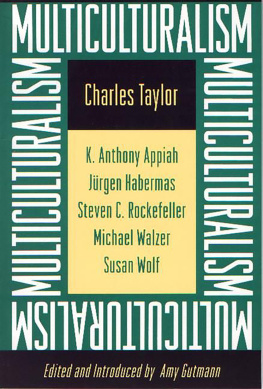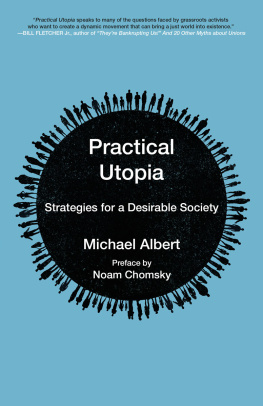Copyright 1994 by Princeton University Press
Published by Princeton University Press, 41 William Street,
Princeton, New Jersey 08540
In the United Kingdom: Princeton University Press,
Chichester, West Sussex
All Rights Reserved
Library of Congress Cataloging-in-Publication Data
Multiculturalism: examining the politics of recognition /
Charles Taylor[et al.]; edited and introduced by Amy Gutmann.
p. cm.
Expanded ed. of: Multiculturalism and The politics of recognition /
Charles Taylor. c1992.
Includes bibliographical references and index.
ISBN 0-691-03779-5 (PA)
1. MulticulturalismUnited States. 2. Multiculturalism.
3. MinoritiesUnited StatesPolitical activity. 4. Minorities
Political activity. 5. Political cultureUnited States.
6. Political culture. I. Taylor, Charles, 1931 .
II. Gutmann, Amy. III. Taylor, Charles, 1931 Multiculturalism
and The politics of recognition.
E184.A1M84 1994
305.8'00973dc20 94-19602
This book has been composed in Linotron Palatino
Princeton University Press books are
printed on acid-free paper and meet the guidelines
for permanence and durability of the Committee
on Production Guidelines for Book Longevity
of the Council on Library Resources
Printed in the United States of America
7 9 10 8 6
 Preface (1994)
Preface (1994) 
S INCE its publication in 1992, Multiculturalism and The Politics of Recognition has appeared in Italian, French, and German editions. The German edition includes an extended commentary by the political philosopher Jrgen Habermas, who adds an important voice to a now-multinational discussion about the relationship between constitutional democracy and a politics that recognizes diverse cultural identities. We invited K. Anthony Appiah, Professor of Afro-American Studies and Philosophy at Harvard, to offer his reflections on the politics of recognition. Appiah has written a rich essay on the problematic relationship between recognition of collective identities, the ideal of individual authenticity, and the survival of cultures. We are pleased to be able to include both essays in this expanded edition.
Drawing on a Kantian perspective, Habermas argues that equal protection under the law is not enough to constitute a constitutional democracy. We must not only be equal under the law, we must also be able to understand ourselves as the authors of the laws that bind us. Once we take this internal connection between democracy and the constitutional state seriously, Habermas writes, it becomes clear that the system of rights is blind neither to unequal social conditions nor to cultural differences. What count as equal rights for women or for ethnic and cultural minorities cannot even be understood adequately until members of these groups articulate and justify in public discussion what is relevant to equal or unequal treatment in typical cases. Democratic discussions also enable citizens to clarify which traditions they want to perpetuate and which they want to discontinue, how they want to deal with their history, with one another, with nature, and so on. Constitutional democracy can thrive on the conflict generated by these discussions and live well with their democratic resolutions, Habermas suggests, as long as citizens are united by mutual respect for others' rights.
Habermas distinguishes between culture, broadly understood, which need not be shared by all citizens, and a common political culture marked by mutual respect for rights. Constitutional democracy dedicates itself to this distinction by granting members of minority cultures equal rights of coexistence with majority cultures. Are these group rights or individual rights? Habermas maintains that they are individual rights of free association and nondiscrimination, which therefore do not guarantee survival for any culture. The political project of preserving cultures as if they were endangered species deprives cultures of their vitality and individuals of their freedom to revise and even to reject their inherited cultural identities. Constitutional democracies respect a broad range of cultural identities, but they guarantee survival to none.
Appiah's essay provides further reason to worry about the demand for cultural survival understood as a political guarantee that any culture continue to exist through indefinite future generations. Appiah agrees with Taylor that there are legitimate collective goals whose pursuit will require giving up pure proceduralism, but indefinite cultural survival is not among those goals. In explaining why, Appiah gives voice to the ideal of individual autonomy, exploring its uneasy relationship with collective identity.
Appiah asks us to worry about the fact that collective identitiesthe identification of people as members of a particular gender, race, ethnicity, nationality, or sexualitycome with notions of how a proper person of that kind behaves: it is not that there is one way that gays or blacks should behave, but that there are gay and black modes of behavior. Personal dimensions of identitybeing witty, wise, and caringdo not typically work in the same way as the collective dimensions. The collective dimensions, Appiah writes, provide what we might call scripts: narratives that people can use in shaping their life plans and in telling their life stories. In our society (though not, perhaps, in the England of Addison and Steele) being witty does not in this way suggest the life-script of the wit.
The life-scripts associated with women, homosexuals, blacks, Catholics, Jews, and various other collective identities have often been negative, creating obstacles to, rather than opportunities for, living a socially dignified life and being treated as equals by other members of their society. The demand for political recognition might be viewed as a way of revising the inherited social meaning of their identities, of constructing positive life scripts where there once were primarily negative ones. It may even be historically, strategically necessary, Appiah speculates, for the story to go this way. But, he immediately adds, anyone who takes autonomy seriously should not be satisfied were the story to end this way, for would we not have then replaced one kind of tyranny with another? Is the strategic virtue of a politics of recognition not also a vice from the perspective of individual autonomy? Appiah rejects group recognition as an ideal because it ties individuals too tightly to scripts over which they have too little authorial control. The politics of recognition, Appiah worries, requires that one's skin color, one's sexual body, should be acknowledged politically in ways that make it hard for those who want to treat their skin and their sexual body as personal dimensions of the self. And personal means not secret, but not too tightly scripted.
Can there be a politics of recognition that respects a multitude of multicultural identities and does not script too tightly any one life? Both Appiah and Habermas offer complex answers to this question, pointing to the possibility that some form of constitutional democracy may offer such a politics, based not on class, race, ethnicity, gender, or nationality, but rather on a democratic citizenship of equal liberties, opportunities, and responsibilities for individuals.
Amy Gutmann
March 25, 1994
 Preface and Acknowledgments
Preface and Acknowledgments 










 Preface (1994)
Preface (1994)